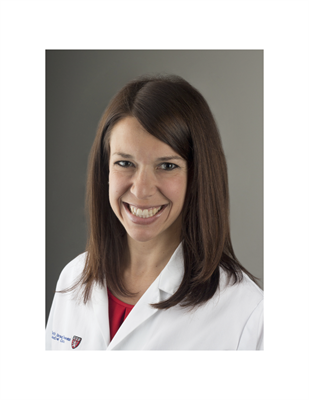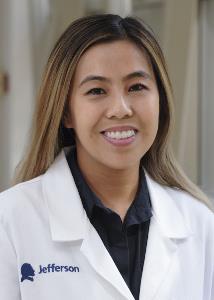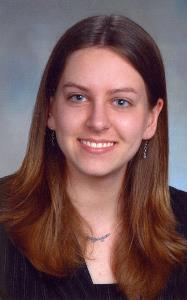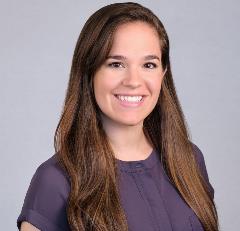Success Stories
Maureen (Mo) Canellas, MD
Position Title: Fellow
Institution: University of Massachusetts Medical School
Fellowship Program: Administrative
1. What was your fellowship experience like?
My time here at UMass has been invaluable. Last year, I was immediately welcomed as a member of the leadership team and taught about the goals and trajectory of the department. Suddenly, I was privy to the how, when, and why of department changes. The most unique experience has been the debrief meetings with my fellowship director after team meetings. We discuss what I would have changed or done differently, what politics may be at play, and what values were aligned or misaligned between parties. Being able to have that time for reflection on my leadership style and management has been a unique experience that I did not know I would get during fellowship.
2. What advice would you give to someone who was on the fence about doing a fellowship?
I would advise anyone who is considering this fellowship to reach out to their medical director or operations team to discuss their interest. They have invaluable insight and can help advise you through your decision process.
Overall, administration fellowships can be quite flexible and personalized toward your interests in administration and leadership. The one or two years of extra training will allow you to hone your administrative skills beyond what you would get from going straight into an attending job. In addition, many administrative fellowships offer protected time and subsidized tuition for a graduate degree (e.g., MBA, MHA, MPH). These opportunities are invaluable and can help set you apart from other candidates for leadership positions.
3. What was the most career-enhancing, or eye-opening thing, you gained from the fellowship?
I capped off my first year of fellowship with the coronavirus pandemic. It has been inspiring to watch the administration team work tirelessly to manage all the needed changes in the department. Even through the pandemic, the administration team ensured my learning and fellowship experience continued at full speed. From learning about staff redeployment and the creation of unique care spaces to implementing my own intubation protocol, these first-hand experiences of leading in ambiguity have been vital to my development as a leader and manager.
4. What are your career plans after fellowship?
I plan to stay in academic emergency medicine, hopefully as part of a clinical operations and administration team. Outside of clinical work, I plan to continue researching national visit and metric trends through my involvement with the Emergency Department Benchmarking Alliance. I hope to utilize national research insights to improve patient care and experience in my own emergency department as well as improve and inform the national practice of emergency medicine.

Nicole Dubosh, MD
Associate Professor of Emergency Medicine
Harvard Medical School
Associate Clerkship Director
Beth Israel Deaconess Medical Center
1. What advice would you give to someone who was on the fence about doing an education fellowship? i.e. What did you see as the cost-benefit?
A medical education fellowship will provide you with specialized training and an in-depth understanding in all facets of medical education: teaching, curriculum development, assessment, medical education research, administration and leadership. This fellowship is best suited for those interested in pursing an academic career in medical education i.e. holding an educational leadership position such as residency program director, clerkship director, vice chair of education, medical school dean, and other roles that require more than just the ability to teach. While not absolutely necessary to get hired on as dedicated medical education faculty, many chairs these days are seeking applicants with fellowship training for these positions and at some institutions, it is a requirement. I would recommend doing an education fellowship if you are considering a true career path in med ed. It is certainly possible to be involved in teaching without a fellowship, and a med ed fellowship is not necessary for those who want a clinical teaching role only. In terms of cost-benefit, there is much variability in the existing medical education fellowships including duration (1 vs 2 years), salary, and requirement to pursue an advanced degree such as an MPH or masters in education. Interested candidates should research different fellowships and consider these factors in their decision.
2. What was the most career-enhancing, or eye-opening thing, you gained from the fellowship?
The most career-enhancing part of my medical education fellowship was being able to dedicate a full year to learning about all aspects of medical education but particularly research. Prior to my fellowship, I have little exposure to education research. I was able to immerse myself in courses on research methodology and writing which was since allowed me to develop my own projects, mentor trainees on med ed studies, collaborate with other medical education researchers across the country on multi-center projects, and obtain grant funding in education research.
 Anna Marie Chang, MD
Anna Marie Chang, MD
Research Fellow
Associate Professor, Thomas Jefferson University
Jefferson Health-Thomas Jefferson University Hospitals
1. What advice would you give to someone who was on the fence about doing an emergency medicine fellowship? i.e. What did you see as the cost-benefit?
My advice for anyone who even has the slightest interest in doing research is to do a research fellowship! It gives you the time and mentored experience which you really need to develop as a researcher. It gives you time to take courses and network. It helped me meet a lot of like-minded people and develop a network of collaborators.A career in emergency medicine isn't a sprint, it's a marathon. And for me, having the protected time to allow me to build my career was very important.
2. What was the most career-enhancing, or eye-opening thing, you gained from the fellowship?
I learned to write. I learned statistics. I learned to work with a team, and to run a research program. Research is really a team sport, and I appreciate the opportunity to collaborate and work with so many people.
3. Who is an international emergency medicine fellowship for?
A research fellowship is for anyone who really wants to take that next step to develop a career in research. It's very difficult to do so without the protected time and environment of a fellowship.

Megan Rybarczyk, MD
International Emergency Medicine Fellow
Division of International Emergency Medicine and Humanitarian Programs (DIEMHP)
Brigham and Women's Hospital and Faulkner Hospital
Clinical Fellow, Harvard Medical School
1. What advice would you give to someone who was on the fence about doing an international emergency medicine fellowship? i.e. What did you see as the cost-benefit?
My advice would be that if you are at all planning to do any work that crosses borders that is related to Emergency Medicine (i.e. clinical practice, systems development, education, humanitarian and disaster response, research, ethics, policy, and so on), it is your professional responsibility to seek out formal training in these fields. In my opinion, International Emergency Medicine (IEM) fellowships are a significant resource in this area.
My time in the Harvard/Brigham and Women's program has been invaluable. It has given me time to pursue my interests and to receive sub-specialty training in global emergency care; experience and training that I feel I would not have had otherwise. Additionally, it has provided the networking that is essential in such a relatively small field.
While many feel that completing a fellowship delays your career advancement, this is not true at all. While it may delay some immediate rewards, it can set you up to be a step ahead when you finish, if you take full advantage of your fellowship to obtain advanced degrees and/or to develop long-term projects and relationships. I think of it not only as a professional responsibility to the field, but also as an investment for the future - my own, as well as my future mentees.
One caveat is that you do need to find the fellowship that helps you toward your specific goals as well as toward the specific level of expertise that you seek. Given the number and diversity of fellowships that currently exist, this is likely to be a possibility for nearly everyone contemplating in IEM fellowship.
2. What was the most career-enhancing, or eye-opening thing, you gained from the fellowship?
I would not trade the last two years in fellowship for anything. Although quite busy and challenging, I feel my time in the Harvard/Brigham and Women's program has given me the depth and breath of experiences to further advance my career in this field. The best parts have been the open exchange of ideas and advice as well as the mentorship – not just from individuals in my institution, but across this relatively small field. I hope that as this field continues to grow and to expand that these features - open exchange of ideas, sharing of experiences, and mentorship - remain the most valuable.
3. Who is an international emergency medicine fellowship for?
An IEM fellowship is for someone who wants to become a professional in global emergency care and/or response and to develop a level of expertise in a niche within this field. I feel it is likely most useful for those who want to pursue academic positions in the future, but given the variety of fellowships that exist (with non-standardization of the fellowships being a strength of this consortium, not a weakness, given the diversity of the field), this is not necessarily the case anymore.
Regardless of your ultimate career path and the type of fellowship you choose, it definitely does require someone who is flexible, has a very strong work ethic and is willing to balance more than seems possible all at once (i.e. clinical shifts and international work/projects/grants along with teaching and/or classes for an advanced degree; not to mention your personal and/or family life!), and is committed to the professionalization as well as to the advancement of the field.

